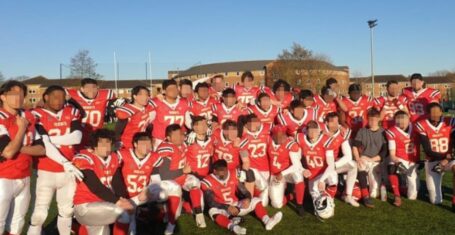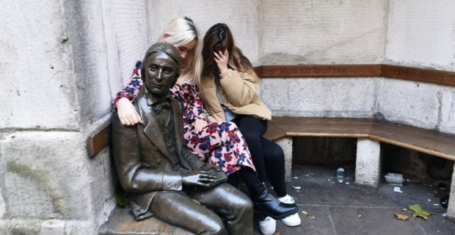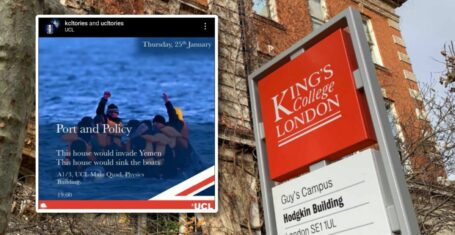
100 years of Votes for Women: but how far has King’s come since then?
Hint: we’ve got a long way to go
This week marks 100 years since over 8.4 million women were given the right to vote for the first time in the UK. With the world celebrating and still fighting for gender equality, it is important to look at how far we've come since then – and how long we still have to go.
As a way of celebrating and paying homage to all of the amazing King's women, we've made a list of all the milestones they have reached towards gender equality, from years before to decades after the Suffragette movement.
1860 – Florence Nightingale established her school of nursing at St Thomas' in 1860
The nursing school, established by the founder of modern nursing, is now one of the oldest medical schools still in operation and was a model for many similar training schools through the UK and other countries for the latter half of the 19th century.
1885 – The Ladies' Department of King's College London was opened in Kensington Square
The Ladies' department was already created as one of the independent "extensions" of King's, with over 500 attendants by 1886. Although the subjects given to women were predominantly female orientated, the ability to go to further education for women was still a progressive attitude – and KCL offered female education at degree level more than 40 years before Oxford and 70 years before Cambridge.
1899 – Virginia Woolf attends KCL
Virginia Woolf, who later went onto influencing English creative writing, writing the truth on how to think like a woman took multiple courses at the Ladies' Department, later going on to shape ideals of women.
King's now have a building – the Virginia Woolf Building – named after her.
1904 – First woman elected for the Fellowship of King's College
The Fellowship of King's College (FKC) is the highest award that can be bestowed upon an individual by KCL.
1908 – First Female Professor
Say hello to Edith Morley, student of the Ladies' Department, suffragette, literary scholar, and England’s first female professor. In 1907 all heads of departments were given professorships except Morley who was the only woman, so began her battle for equality for all women and in 1908 she became the first female professor at an English University or University College.
1920 – First Female Justice of Peace
The Head of the Ladies’ Department from 1894 to 1907, Lillian Faithfull, went on to become the first Female Justice of the Peace in England and became one of the first female magistrates in England.
During World War I, the medical school was opened to women for the first time
As many of the men went off to war, women were finally allowed to take on the role as doctors – a role in which they proved to be just as good at as their male counterparts.
1940s – Record five Academy Award nominations for KCL alumni Actress
We've got beauty, we've got brains – and there's no better person to show this than the record creating Greer Garson who in the course of her career received seven Academy Award Nominations after studying at King's College London, where she earned degrees in French and 18th century literature.
1953 – The Discovery of DNA's structure
King's alumni, Rosalind Franklin, together with Maurice Wilkins, made great leaps in the discovery of DNA's structure, paving the road for modern biology.
1998 – Florence Nightingale School of Nursing and Midwifery
Florence Nightingale's original training school for nurses merged with the King's Department of Nursing Studies, becoming the Florence Nightingale School of Nursing and Midwifery. The school now offers Perseverance trust scholarships and grants for Nursing or Midwifery, having long lasting effects for females in the medical sector.
2008 – KCL gained the Bronze Athena Swan Award
The Athena Swan Charter focuses on the progression of women academics and researchers in the STEMM (Science, Technology, Engineering, Mathematics and Medicine) subjects and more recently in humanities, social services and women in professional services. This reward was renewed again in 2013 and up for renewal again on 2016.
2013 – 2014 The Aurora Programme
This programme was launched at King's with an aim to help identify leadership potential in women and give them greater confidence. From 2015 to 2016, 30 women were sponsored by this programme.
2013 – 2014 Parenting Fund Established
Equality in the form of equity is the best type. A fund that supports women and their biological difference, taking into account that a pregnancy should not put a stop to female education and progress is a huge step for gender equality.
2016 – Unconscious Bias training becomes mandatory
The Unconscious Bias training becomes mandatory at King's for professional service staff grade 7 and above, including seminar tutors and lecturers. It targeted the results from several tests, which showed that women were seen as significantly less hireable than men, even when they had the same qualifications and experience.
On the surface, it seems that King's has been and still is effective in boosting gender equality. But how much of this equality stems from King's College participation as opposed to women's hard work?
Out of the 20 most recent principals, all 20 have been middle aged white men since 1831 and all Deans have also been middle aged white men since 1903. If King's is meant to lead by example, it doesn't seem to do a too great of a job in this respect.
Since 1917, out of the 12 Nobel Laureates, all 12 were male. It is hard to believe that no female who studied at King's had the capabilities to be a Nobel Laureate, but maybe they didn't have the means – and they didn't receive enough support from their University. In a world where men and women aren't equal, an approach of equity should be taken, providing more support to women to allow them the same access and possibilities as those effortlessly afforded to men. So maybe next time – but we're not there yet King's.









































